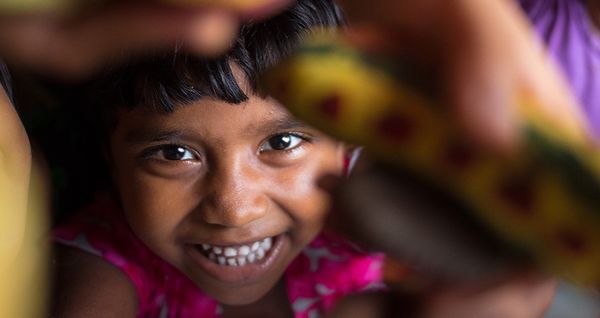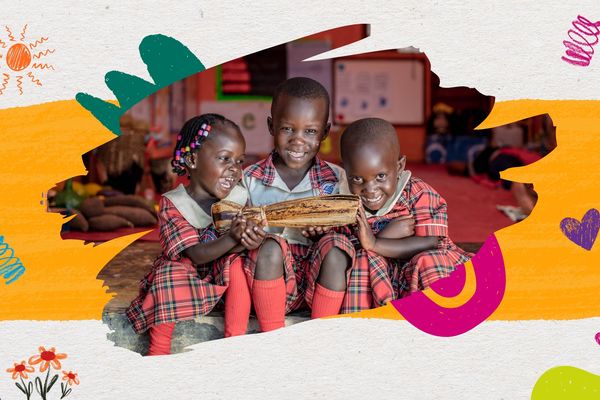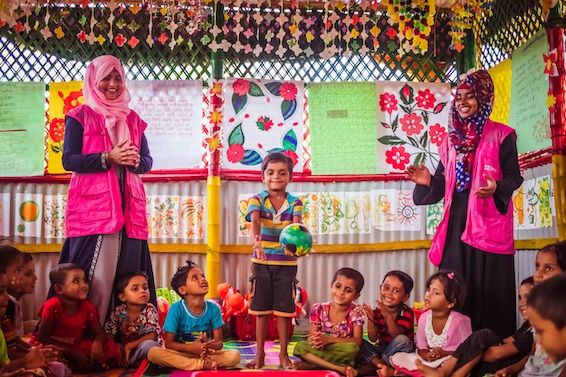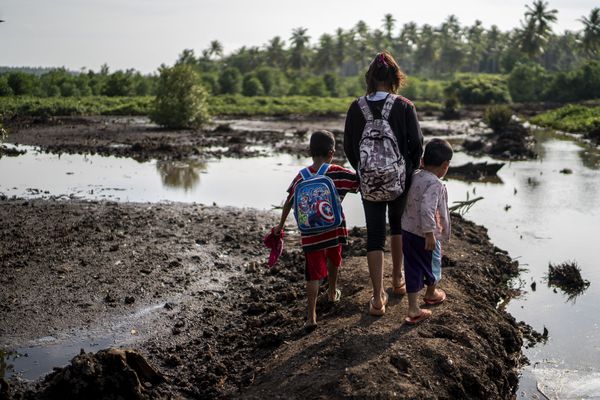NEW YORK, NY – BRAC USA announced today the results of a two-year study of BRAC’s Play Lab early childhood development initiative in Bangladesh, which has been created in partnership with the LEGO Foundation. The study was conducted by researchers at the University of Cambridge and Columbia University and reveals that the Play Lab intervention achieved a primary but elusive aim of preschool education: to ensure that, when starting formal schooling, all children are equally developmentally equipped to benefit from it. The research reveals a path to equitable early childhood development, one that enables children who are the least privileged to enter kindergarten as well prepared as those who are the most privileged.
The research study, which ran from 2018 to 2019, assessed the impact of the Play Labs for 367 children from three to five years of age. The Play Labs are safe spaces where children can engage in play, supported by a play-based curriculum that is culturally relevant and designed to suit the local contexts, while also promoting children’s cognitive, language, physical, and social-emotional development. Of the 367 children in the study, 196 were in 40 Play Labs (88 boys and 108 girls) and 171 in a control group of children who primarily remained at home in the first year and attended government-run preschool in the second year (87 boys and 84 girls).
A multi-year partnership between BRAC and the LEGO Foundation supports an extensive play-based learning initiative. Through it, BRAC has created 110 community-based Play Labs in Bangladesh and another 400 within government primary schools in Bangladesh. BRAC has also trained 315 adolescent girls and young women to act as facilitators or Play Leaders in the community-based Play Labs. The play spaces and curriculum are designed by the BRAC Institute of Educational Development at Brac University.
The major findings of the study are as follows:
- The beneficial outcomes of the Play Lab experience for children from three to five years of age were extensively and consistently evidenced across all four measures of development used in the project. For each measure, the Play Lab children outperformed the control group children, at moderate levels in year one and then dramatically in year two, resulting in very dramatic differences between the two groups over the course of the project. Additional analysis clearly indicated that the gap between the initially weaker and stronger children had been narrowed. By the end of year two, there was only a small gap between the initially low, medium, and high-performing groups, indicating the Play Labs’ ability to level the playing field. This is crucial to ensuring that all children enter primary school with the skills they need to learn and succeed.
- The Play Lab experience significantly improved the parents’ knowledge, attitudes and practices (KAP) related to early childhood development and education. By comparison, the control group parents’ KAP scores also improved, but not to the same degree as that of the Play Lab parents. Within each year, and across the whole project, the Play Lab parents’ scores were significantly greater than those of the control group parents overall and for all elements of the interview protocol.
- Highly significant progress arose from the Play Lab experience in the Play Leaders’ KAP scores, the quality of their interactions with the Play Lab children, and the fidelity with which they carried out the Play Lab program. Not surprisingly, their KAP scores were significantly higher than those of the children’s parents, and they made as much progress in their KAP scores in one year as the parents achieved in two. The quality of the Play Leaders’ interactions with the children also showed highly significant improvements. Over the course of the whole project, this was the case for all 21 indicators observed.
- The fidelity with which the Play Leaders carried out the Play Lab program also showed highly significant improvement in both years one and two. This is an outstanding and important outcome. In many such educational interventions, lack of fidelity is a significant problem leading to poor outcomes. The high levels of fidelity achieved here indicate the importance of the dosage and high quality of the in-service and mentoring provision for the Play Leaders by the BRAC team during the project.
“These are superb results,” said Cassie Landers, EdD, MPH, Assistant Professor of Population and Family Health at the Columbia University Mailman School of Public Health, a key researcher on the study. “They reveal the significant positive impact of the Play Lab intervention compared to the control group. They also show that the Play Lab intervention enables all the children, whatever their initial level of overall development and play skills, to enter primary school equally ready developmentally to benefit from it.”
In conjunction with these research findings, BRAC has launched the PlayBook, a new dedicated knowledge hub for play in early childhood. The PlayBook is a toolkit designed to share the Play Lab approach and learning with governments, professionals, and advocates involved in promoting early childhood development locally, nationally, or globally. Its goal is to equip others with the tools to learn from, adapt, and contextualize Play Labs in their own countries and communities.
See the research brief for a fuller description of the research and its findings.
Notes to the editor
BRAC is a global leader in developing and implementing cost-effective, evidence-based programs to empower the most marginalized people in extremely poor, conflict-prone, and post-disaster settings. Founded in Bangladesh in 1972, BRAC now touches the lives of more than 100 million people across 11 countries in Asia and Africa. BRAC takes a holistic approach to alleviating poverty, running programs in education, health care, financial inclusion, youth empowerment, agriculture, and more. In 2021, it was ranked the top NGO in the world by NGO Advisor for the sixth consecutive time.
Based in New York, BRAC USA is the North American affiliate of BRAC. BRAC USA provides comprehensive support to BRAC around the world by raising awareness about its work to empower people living in poverty and mobilizing resources to support its programs. BRAC USA also works closely with its international counterparts to design and implement cost-effective and evidence-based poverty innovations worldwide. BRAC USA is an independent 501(c)(3) organization.
Media contact
Elizabeth Wright, Director of Communications, BRAC USA



